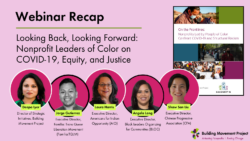Apr
2
2021
In March, the Building Movement Project hosted a national webinar to explore the ongoing effects of the pandemic and structural racism on nonprofits. Jorge Gutierrez (Familia: Trans Queer Liberation Movement), Laura Harris (Americans for Indian Opportunity), Angela Lang (Black Leaders Organizing for Communities in Milwaukee), and Shaw San Liu (Chinese Progressive Association in San Francisco) joined Deepa Iyer, BMP’s Director of Strategic Initiatives, for a conversation about the themes and issues raised in BMP’s report On the Frontlines: Nonprofits Led by People of Color Confront COVID-19 and Structural Racism.
Quick Access: Recording, Transcript, On the Frontlines Report
We began our webinar acknowledging the shootings that claimed lives in Atlanta and Boulder and the rise in anti-Asian violence across the country. We also provided data points and stories from our 2020 report that included sobering concerns from nonprofit leaders of color about their own leadership and their organization’s financial sustainability for the long term. What we learned from our conversation a year after the emergence of COVID-19 as a global pandemic is that not much has changed; however, leaders of color remain steadfast and committed to an equitable recovery that reimagines systems that have failed people of color for decades.
We have included some key takeaways and recommendations from our panelists below, and we encourage you to listen to the recording or read the transcript of this powerful and timely conversation.
Even as many Americans are planning to get “back to normal,” for communities of color, the effects of the pandemic will last for years to come.
Jorge clarified that the issues impacting communities of color —both due to the pandemic and to systemic inequities that predate COVID-19 – are going to continue, and that the most vulnerable in our communities are going to face even more hardship. In addition to the challenges of unemployment, food insecurity, lack of housing and healthcare, many community members are also facing discrimination, racism, transphobia, criminalization, deportations, and other forms of state sanctioned violence. These issues have been amplified by the pandemic, and compounded by new needs related to equitable access to COVID-19 testing and vaccine distribution. Jorge noted that in California, Latinx people represent a disproportionate amount of COVID-related deaths (46%), yet only account for little more than a third of the total population. These numbers, and the urgent community needs identified by Jorge, illustrate how community-based organizations are not only bearing the brunt of long-standing issues, but also new challenges as a result of the pandemic.
We need bold, new solutions to replace old systems that have never worked for communities of color.
The panelists recognized this moment as an opportunity to discard systems and policies that are ineffective and harmful, and to imagine bold solutions that are community-based and community-centered. Laura asked: “How do we replace systems that are failing us versus just propping them up and getting them going again?” Jorge called for deep systematic change that would allow people to “not just survive, but also thrive and have more opportunities to dream and to feel protected in their communities.”
Angela noted that people need short-term relief to survive, but that there is an opening right now to push discussions towards long-term systemic change. Shaw San added that this moment is a “window of opportunity to redefine what is ‘normal'” for funders, nonprofit organizations, government actors, and society at large.” She reminded us that the scale and boldness of our solutions must match the scale of the problems.
Laura offered an indigenous framework for these solutions – relationships, responsibility, reciprocity, and redistribution – that not only aligns well with BMP’s understanding of transformative solidarity practice, but also speaks to the interconnectedness of community values and the need to shift systems and policies.
Social change organizations and leaders need support and sustainability.
In our report on POC-led nonprofits and the pandemic, we found that nonprofit leaders of color are being impacted by the overlapping crises of the past year (the pandemic, anti-Black racism and police brutality, the 2020 uprisings, the January insurrection, anti-Asian violence, and more) in ways that they have not experienced before. We heard, particularly from women of color, that they are tending to not only their own needs and worries, but to those of their family members, their staff, and their community. Many leaders identified that they are burnt out, overwhelmed, and isolated. Our panelists echoed these feelings, and also urged the nonprofit and philanthropic sectors to center the needs of leaders of color with an eye towards sustainability and solidarity.
Angela pushed us to think about how our practices can be trauma-informed so that organizations and their staff are sustained for the long term. Jorge added that philanthropy and funders need to trust and fund BIPOC leadership, provide multi-year grants and unrestricted funds, and deeply understand the goals, dreams, and visions of the organizations and communities with which they’re working. And finally, Angela reminded us that internally extending grace and setting boundaries can be a way of sustaining ourselves as people working in these movements.

